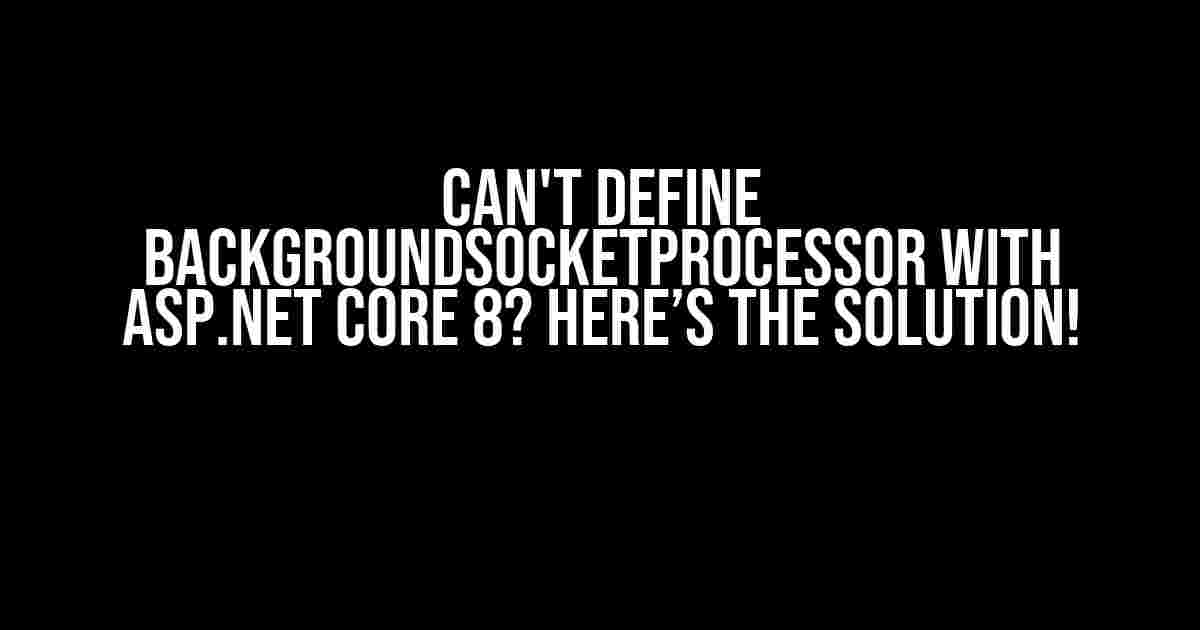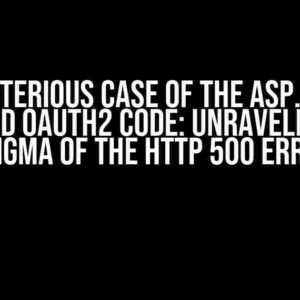Are you dealing with the frustrating issue of not being able to define BackgroundSocketProcessor with ASP.NET Core 8? Well, you’re in luck because we’ve got you covered! In this comprehensive guide, we’ll walk you through the steps to resolve this problem and get your application up and running smoothly.
What is BackgroundSocketProcessor?
Before we dive into the solution, let’s take a quick look at what BackgroundSocketProcessor is. BackgroundSocketProcessor is a class in ASP.NET Core that allows you to process incoming socket connections in the background. This is particularly useful when you need to handle a large volume of concurrent connections, such as in a real-time web application.
The Problem: Can’t Define BackgroundSocketProcessor with ASP.NET Core 8
With the release of ASP.NET Core 8, some developers have reported issues when trying to define BackgroundSocketProcessor in their applications. The error message typically reads:
"Cannot define BackgroundSocketProcessor with ASP.NET Core 8. Please ensure that you are using the correct namespace and class name."
This error is often caused by incorrect namespace references, outdated NuGet packages, or incorrect class implementations. Don’t worry, though – we’ll cover each of these potential issues and provide step-by-step solutions to get you back on track.
Step 1: Verify Namespace References
The first thing to check is that you’re using the correct namespace references in your code. Make sure you have the following using statements at the top of your file:
using Microsoft.AspNetCore.Builder; using Microsoft.AspNetCore.Hosting; using Microsoft.Extensions.DependencyInjection;
If you’re missing any of these namespace references, add them to your file and try recompiling your application.
Step 2: Check NuGet Package Versions
Outdated NuGet packages can often cause compatibility issues with ASP.NET Core 8. Ensure that you’re using the latest versions of the following NuGet packages:
- Microsoft.AspNetCore.Server.Kestrel
- Microsoft.AspNetCore.WebSockets
- Microsoft.Extensions.DependencyInjection
You can update these packages using the NuGet Package Manager in Visual Studio or by running the following command in the terminal:
dotnet add package Microsoft.AspNetCore.Server.Kestrel --version 8.0.0 dotnet add package Microsoft.AspNetCore.WebSockets --version 8.0.0 dotnet add package Microsoft.Extensions.DependencyInjection --version 8.0.0
Step 3: Implement BackgroundSocketProcessor Correctly
Now that we’ve verified the namespace references and NuGet package versions, let’s move on to implementing the BackgroundSocketProcessor class correctly. Here’s an example of how you can define the class:
public class BackgroundSocketProcessor : BackgroundService
{
private readonly ILogger _logger;
public BackgroundSocketProcessor(ILogger logger)
{
_logger = logger;
}
protected override async Task ExecuteAsync(CancellationToken stoppingToken)
{
_logger.LogInformation("BackgroundSocketProcessor is running.");
// Your socket processing logic goes here
}
}
Notice that we’re inheriting from the BackgroundService class and overriding the ExecuteAsync method. This is where you’ll implement your socket processing logic.
Step 4: Register BackgroundSocketProcessor in Startup.cs
Finally, we need to register the BackgroundSocketProcessor class in the Startup.cs file. Add the following code to the ConfigureServices method:
public void ConfigureServices(IServiceCollection services)
{
services.AddHostedService();
}
This will register the BackgroundSocketProcessor as a hosted service, allowing it to run in the background and process incoming socket connections.
Troubleshooting Common Issues
If you’re still experiencing issues with defining BackgroundSocketProcessor with ASP.NET Core 8, here are some common issues to check:
- Make sure you’re targeting the correct .NET Core version (8.0 or higher) in your project.
- Verify that you’re using the correct namespace references and class names.
- Check for any syntax errors or typos in your code.
- Ensure that you’ve updated your NuGet packages to the latest versions.
Conclusion
And that’s it! By following these steps, you should now be able to define BackgroundSocketProcessor with ASP.NET Core 8 without any issues. Remember to verify namespace references, check NuGet package versions, implement the BackgroundSocketProcessor class correctly, and register it in the Startup.cs file. If you’re still experiencing issues, refer to the troubleshooting section to identify and resolve common problems.
Happy coding!
| Keyword | Description |
|---|---|
| BackgroundSocketProcessor | A class in ASP.NET Core that allows processing of incoming socket connections in the background. |
| ASP.NET Core 8 | The latest version of the ASP.NET Core framework, which introduced changes to the BackgroundSocketProcessor class. |
| BackgroundService | A base class in ASP.NET Core that provides a way to run tasks in the background. |
FAQs
-
Q: What is the purpose of BackgroundSocketProcessor?
A: BackgroundSocketProcessor is used to process incoming socket connections in the background, allowing for efficient handling of concurrent connections.
-
Q: Why am I getting an error when trying to define BackgroundSocketProcessor with ASP.NET Core 8?
A: This error is often caused by incorrect namespace references, outdated NuGet packages, or incorrect class implementations. Follow the steps outlined in this guide to resolve the issue.
-
Q: What is the correct namespace reference for BackgroundSocketProcessor?
A: The correct namespace reference is
Microsoft.AspNetCore.Builder,Microsoft.AspNetCore.Hosting, andMicrosoft.Extensions.DependencyInjection.
Here are 5 Questions and Answers about “Can’t define BackgroundSocketProcessor with ASP.NET Core 8” in HTML format:
Frequently Asked Question
Get the inside scoop on resolving the “Can’t define BackgroundSocketProcessor with ASP.NET Core 8” conundrum!
What is BackgroundSocketProcessor, and why do I need it?
BackgroundSocketProcessor is a crucial component in ASP.NET Core that enables efficient management of socket connections in the background. It’s essential for handling tasks that require long-running connections, such as WebSockets or WebRTC. By using BackgroundSocketProcessor, you can ensure seamless communication between your server and clients, even when dealing with complex, real-time applications.
Why can’t I define BackgroundSocketProcessor with ASP.NET Core 8?
The reason you’re struggling to define BackgroundSocketProcessor with ASP.NET Core 8 is because it’s been removed from the framework starting from .NET 6. Microsoft has shifted its focus towards more efficient and performance-oriented solutions, such as the `BackgroundService` and `IHostedService` interfaces. These new interfaces offer more flexibility and control over background tasks, making them a better fit for modern application development.
What are the alternatives to BackgroundSocketProcessor in ASP.NET Core 8?
Don’t worry, there are excellent alternatives to BackgroundSocketProcessor! You can leverage the power of `BackgroundService` and `IHostedService` to create long-running background tasks that can handle socket connections efficiently. Additionally, you can explore libraries like SignalR or WebSockets middleware to simplify your WebSocket implementation and abstract away the underlying complexities.
How do I implement a background service to handle socket connections in ASP.NET Core 8?
To create a background service for handling socket connections, you’ll need to create a new class that inherits from `BackgroundService` or `IHostedService`. Then, override the `ExecuteAsync` method to implement your socket connection logic. Don’t forget to register your service in the DI container by adding it to the `IServiceCollection` in the `Startup.cs` file. This way, your background service will be instantiated and started automatically when your application starts.
Are there any performance benefits to using background services over BackgroundSocketProcessor?
Absolutely! Background services in ASP.NET Core 8 offer significant performance benefits compared to BackgroundSocketProcessor. They provide better resource management, improved scalability, and enhanced fault tolerance. By leveraging the `BackgroundService` and `IHostedService` interfaces, you can write more efficient, scalable, and maintainable code that’s better suited for modern, high-performance applications.


